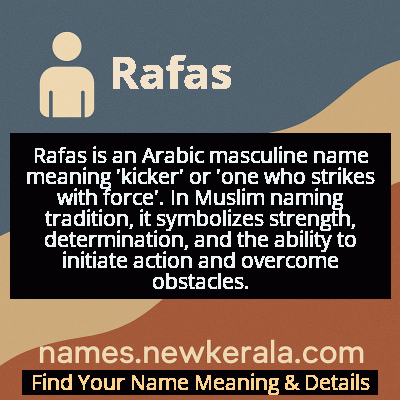Rafas Name Meaning & Details
Origin, Popularity, Numerology Analysis & Name Meaning of Rafas
Discover the origin, meaning, and cultural significance of the name RAFAS. Delve into its historical roots and explore the lasting impact it has had on communities and traditions.
Name
Rafas
Gender
Male
Origin
Muslim
Lucky Number
9
Meaning of the Name - Rafas
Rafas is an Arabic masculine name meaning 'kicker' or 'one who strikes with force'. In Muslim naming tradition, it symbolizes strength, determination, and the ability to initiate action and overcome obstacles.
Rafas - Complete Numerology Analysis
Your Numerology Number
Based on Pythagorean Numerology System
Ruling Planet
Mars
Positive Nature
Generous, passionate, energetic, and humanitarian.
Negative Traits
Impulsive, impatient, moody, and can be overly emotional.
Lucky Colours
Red, maroon, scarlet.
Lucky Days
Tuesday.
Lucky Stones
Red coral, garnet.
Harmony Numbers
1, 2, 3, 6.
Best Suited Professions
Military, sports, philanthropy, leadership roles.
What People Like About You
Courage, energy, leadership, generosity.
Famous People Named Rafas
Rafas Al-Mansouri
Religious Scholar
Renowned Islamic jurist known for his commentaries on Hadith and contributions to Islamic jurisprudence
Rafas bin Khalid
Military Commander
Led successful defensive campaigns during regional conflicts and celebrated for strategic military leadership
Rafas Al-Harithi
Poet
Influential Arabic poet known for works exploring identity, tradition, and social change in modern Arab society
Rafas Mohammed
Business Leader
Pioneering entrepreneur who established one of the largest construction companies in the Gulf region
Name Variations & International Equivalents
Click on blue names to explore their detailed meanings. Gray names with will be available soon.
Cultural & Historical Significance
The name's usage spans across various Muslim cultures, from the Middle East to South Asia, where it maintains its core meaning while adapting to local linguistic patterns. In many communities, the name Rafas is seen as embodying the ideal of proactive faith - not just believing, but actively engaging with and impacting one's world, much like the metaphorical 'kick' that initiates movement and change. This cultural significance extends to modern contexts where the name continues to represent the values of initiative, strength, and the courage to make decisive moves in both personal and communal spheres.
Extended Personality Analysis
Individuals named Rafas are typically perceived as strong-willed, determined, and action-oriented. They often exhibit natural leadership qualities and a proactive approach to problem-solving, reflecting the name's meaning of forceful initiation. These individuals tend to be decisive in their actions and unafraid to take the first step in challenging situations, embodying the 'kicker' symbolism of their name. Their personality often combines practical intelligence with physical confidence, making them effective in both intellectual and hands-on endeavors.
Rafas bearers are usually seen as reliable and resilient, capable of withstanding pressure while maintaining their forward momentum. They often possess a competitive spirit balanced by a strong sense of justice and fairness. While they can be assertive, this is typically tempered by cultural values of respect and community responsibility. Their determination is usually channeled toward constructive goals, and they're known for their ability to inspire action in others through their own example of purposeful living. The combination of strength and responsibility makes them natural leaders who can mobilize others toward shared objectives.
Modern Usage & Popularity
In contemporary times, Rafas maintains steady popularity within Muslim communities worldwide, particularly in Arab countries, Pakistan, and Muslim diaspora communities. While not among the most common names, it enjoys consistent usage due to its strong meaning and cultural resonance. The name has seen moderate popularity in Gulf countries where traditional Arabic names with powerful meanings are highly valued. In recent decades, there's been a slight increase in usage among younger parents seeking names that combine traditional roots with distinctive character. Digital globalization has also helped maintain the name's visibility, with social media platforms allowing bearers from different regions to connect and share their name's heritage. The name continues to be chosen by families valuing both cultural tradition and the qualities of determination and strength it represents, ensuring its continued relevance in modern naming practices.
Symbolic & Spiritual Meanings
Symbolically, Rafas represents initiation, breakthrough, and the power to overcome resistance. The 'kicking' action metaphorically signifies the ability to start movements, break through barriers, and initiate change. In a spiritual context, it can represent the soul's capacity to 'kick' away negative influences or obstacles to personal growth. The name also symbolizes momentum - the idea that a single decisive action can set larger processes in motion. In Islamic symbolism, this aligns with concepts of striving (jihad) in the path of righteousness and the importance of taking proactive steps toward improvement. The name carries undertones of protection and defense, suggesting the ability to 'kick back' against adversity or injustice. It embodies the principle that meaningful change often requires forceful initiation and the courage to make the first move, whether in personal development, social reform, or spiritual advancement.

